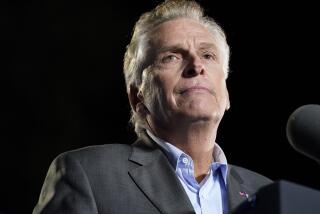Doctors Back Key Elements of Plan, Poll Finds
- Share via
WASHINGTON — Despite reservations, a majority of the nation’s physicians back many key elements of President Clinton’s emerging health care reform agenda--even if it curtails their income and professional freedom, according to the largest survey yet of American doctors on the issue.
And nearly half of the doctors polled said that they reluctantly would favor government-imposed limits on medical spending if no other way can be found to control costs, according to the survey by the Times Mirror Center for the People and the Press.
The support by physicians is good news for the Clinton Administration, whose senior advisers have said that they think many Americans will get an earful on health care reform from their personal doctors as the White House begins to promote the program to Congress and the public in the months ahead. The plan is to be released in May.
The telephone poll was one of three elements of a Times Mirror survey released Tuesday that gauges the opinions of three separate groups: physicians, doctors in leadership roles and the public.
The survey of practicing physicians found a pervasive mood of pessimism, with 7 of 10 saying that they believe their incomes would fall, 8 of 10 expecting to have less freedom to make treatment decisions and a bare majority saying that they expect the quality of health care for Americans to diminish.
Still, 68% of the doctors said that the most important goal of comprehensive reform is to guarantee universal access to medical care, with most willing to achieve that goal by waiting longer for new technologies or by having their patients wait longer for non-emergency treatment.
And 58% of the physicians “gave a positive response to managed competition in its entirety,” according to Robert C. Toth, project director of the survey, while 41% favored a government-run, single-payer system.
Managed competition is the foundation of the new system. Under it, health “alliances,” or large consumer purchasing groups, would be set up in most regions of the country to bargain for health insurance plans. In most markets, individual consumers then would be able to choose from a variety of insurance plans, ranging from HMOs to traditional fee-for-service plans.
Under a single-payer plan, such as Canada’s, the entire system is operated by the government and paid for through taxes.
“This is a real opportunity for the Administration to sell the plan to the physician community,” Andrew Kohut, director of the center, said of the findings. “There’s more give in doctors’ attitudes than we would have expected with regard to managed competition.”
The poll of 408 doctors was conducted March 15 to 26 and had a margin of error of plus or minus 5 percentage points. A separate survey of 93 physicians who hold “leadership” positions was conducted in the same period, with a sampling error of 11 percentage points. A third poll, of 1,011 U.S. adults, was conducted April 1 to 4. It had a sampling error of 3 percentage points.
The poll of physicians holding leadership positions included hospital administrators, medical school deans and presidents of professional societies--many of whom are still in practice. That group favored fundamental reform even more strongly than doctors in general, while the survey of the general public found even stronger support still.
More than 63% of the adults questioned in the public part of the survey said that they feared financial catastrophe in the event they or a family member needed long-term care or suffered a major illness. Fifty-nine percent said that they fear loss of employer-provided health insurance.
The Administration, whose research has found similar concerns voiced by Americans, has made “peace of mind” a recurring theme in its campaign to win support for its reforms.
The Times Mirror poll also found that doctors and the public differ markedly in their expectations of the Administration’s proposal, with 53% of the public but only 24% of doctors saying that the White House will make wise recommendations.
Times Mirror Co. is the owner of the Los Angeles Times and other newspaper, broadcasting and publishing enterprises.
Asked about efforts to control health care costs, 48% of doctors and 59% of the public said that they would favor government-imposed limits if no other methods can be found.
More to Read
Sign up for Essential California
The most important California stories and recommendations in your inbox every morning.
You may occasionally receive promotional content from the Los Angeles Times.













